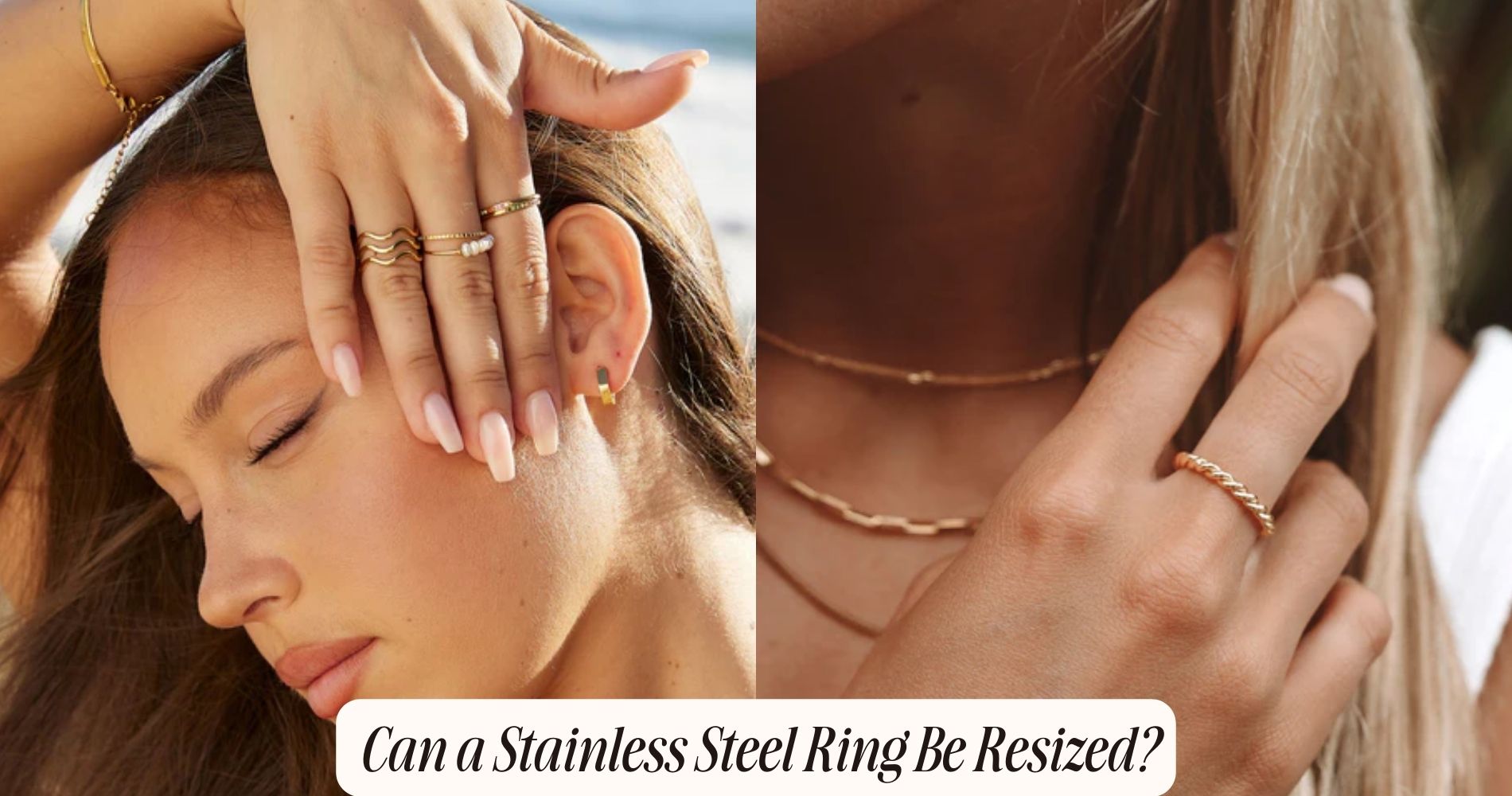
Can a Stainless Steel Ring Be Resized?
Properties of Stainless Steel
Understanding the properties of stainless steel is essential for determining whether a stainless steel ring can be resized. Stainless steel is known for its impressive corrosion resistance, which makes it an ideal material for jewelry that will be exposed to various environmental conditions. This resistance stems from the presence of chromium, which forms a passive layer preventing oxidation.
As a result, your ring won't tarnish or rust easily, maintaining its shine and durability over time.
Another critical property is tensile strength. Stainless steel exhibits high tensile strength, meaning it can withstand significant stress and strain without deforming. This characteristic is important because it ensures the ring remains intact under daily wear and tear.
However, this same strength can pose challenges when attempting to resize the ring, as the material is less malleable compared to softer metals like gold or silver.
Challenges in Resizing
Given stainless steel's high tensile strength and resistance to deformation, resizing a stainless steel ring presents unique challenges not typically encountered with more malleable metals. One primary issue is the metal's exceptional hardness. Stainless steel is much harder than gold or silver, making it difficult to cut and reshape without specialized tools and techniques.
Another challenge is stainless steel's thermal conductivity. When you apply heat to resize the ring, the entire piece can heat up quickly and unevenly. This rapid and uneven heating can lead to warping or damage, especially if not carefully controlled. Unlike softer metals, stainless steel requires precise temperature management to avoid compromising its structural integrity.
Additionally, the metal's inherent corrosion resistance complicates the resizing process. The chromium content that provides this property forms a protective oxide layer on the surface. When you cut or heat stainless steel, you risk disrupting this layer, potentially compromising the ring's corrosion resistance. Restoration of this protective layer isn't straightforward and often requires additional steps like passivation.
Professional Resizing Methods
When it comes to resizing stainless steel rings, you have two primary professional methods at your disposal.
The laser resizing technique employs precision laser cutting and welding to adjust the ring size with minimal material stress.
Alternatively, the ring stretching method involves incrementally expanding the ring's band, which is best suited for minor size adjustments.
Laser Resizing Technique
Laser resizing techniques are frequently employed by professional jewelers to resize stainless steel rings with precision and minimal material loss. This method leverages the high-intensity, focused beam of a laser to make meticulous cuts or fusions in the ring. Stainless steel's magnetic properties and corrosion resistance make it an ideal candidate for this technique, as the material can withstand the laser's heat without guaranteeing its integrity.
When resizing, the jeweler first assesses the ring's current dimensions and the desired size adjustment. Using specialized equipment, they direct the laser to either remove a small section of the ring for downsizing or add material for upsizing. The laser's precision ensures a seamless finish, maintaining the ring's original appearance and structural integrity.
One of the significant advantages of laser resizing is the minimal thermal effect on the surrounding metal. This localized heating prevents warping and preserves the ring's corrosion resistance, thereby, ensuring it remains durable and retains its aesthetic appeal. Additionally, the process is relatively quick, reducing the time your ring spends under alteration.
In essence, laser resizing offers a high-precision, professional approach, perfect for maintaining the quality and longevity of your stainless steel ring.
Ring Stretching Method
The ring stretching method, another professional resizing technique, involves incrementally increasing the diameter of the ring using specialized tools to achieve the desired fit. This method is particularly effective for stainless steel rings due to their inherent metal hardness and corrosion resistance. Stainless steel's robust nature ensures the ring can withstand the stretching process without compromising its structural integrity.
To perform ring stretching, a jeweler utilizes a ring stretcher, a tool specifically designed for this purpose. The ring is placed on a mandrel, and the stretcher gradually applies even pressure to expand the ring's circumference. This meticulous process ensures that the ring maintains its round shape and uniform thickness. However, it's important to mention that this technique is generally suitable for plain bands without intricate designs or settings, as the stretching process can distort detailed features.
Given stainless steel's high metal hardness, a professional's expertise is essential to avoid cracking or damaging the ring. Additionally, stainless steel's corrosion resistance ensures that the ring remains durable and visually appealing even after the resizing process.
While ring stretching can be an effective method, always consult a skilled jeweler to determine the best approach for your specific ring.
Alternative Solutions
If you're hesitant about resizing a stainless steel ring professionally, consider alternative solutions.
You can use ring size adjusters, which are flexible, temporary solutions that fit snugly inside the ring band.
Additionally, custom ring inserts provide a more permanent and tailored fit without altering the original structure of your ring.
Ring Size Adjusters
For those who need a temporary or non-invasive solution, ring size adjusters offer an effective way to guarantee a comfortable fit for stainless steel rings. These handy devices are designed to fit snugly inside your ring, making it smaller without permanent alteration.
One advantage of using ring size adjusters is their compatibility with stainless steel's inherent properties. Stainless steel is known for its temperature resistance and corrosion resistance, ensuring that the adjuster remains effective and durable in various conditions. Whether you're wearing your ring in hot or cold environments, the adjuster won't degrade or lose its functionality.
Ring size adjusters come in multiple forms, including silicone, plastic inserts, and metal clips. Silicone adjusters, for instance, provide a flexible and comfortable fit, while plastic inserts are more rigid and offer a secure hold. Metal clips, often made from stainless steel or other durable metals, can clip onto the ring's band, offering a more permanent but still removable solution.
Installing these adjusters is straightforward. You simply insert or clip them onto the inner circumference of the ring. The process takes only a few minutes and doesn't require any specialized tools. This makes ring size adjusters a practical and efficient choice for resizing stainless steel rings.
Custom Ring Inserts
Custom ring inserts provide a tailored solution for resizing stainless steel rings without compromising their structural integrity. These inserts are designed to fit snugly inside your ring, effectively reducing its internal diameter. You can opt for custom designs that match the aesthetic of your ring, guaranteeing a seamless blend with the original piece.
When selecting personalized inserts, it's crucial to think about the material and finish. High-grade materials like silicone or specialized metals are often used to guarantee durability and comfort. The inserts can be customized in various thicknesses to achieve the perfect fit. This method offers an advantage over traditional resizing techniques, which might weaken the ring or alter its appearance.
To implement this solution, you'll need to consult with a professional jeweler who can create a precise mold of your ring's interior. The jeweler will then fabricate the insert to match the custom design specifications. It's a meticulous process that ensures a perfect fit, enhancing both functionality and comfort.
Custom ring inserts are a practical, non-invasive alternative for resizing your stainless steel ring. They preserve the ring's integrity while offering the flexibility to achieve a personalized fit without permanent alterations.
Cost Considerations
When considering the cost of resizing a stainless steel ring, it's important to factor in the complexity of the process and the specialized tools required. Stainless steel's durability makes it a popular choice for jewelry, but this same property complicates resizing efforts. Because stainless steel is harder than metals like gold or silver, jewelers need specialized equipment and advanced techniques to adjust its size. This complexity translates to higher labor costs, which can be significant if you're working within budget constraints.
To add another layer of consideration, think about the resale value of your stainless steel ring. While resizing can make the ring fit perfectly, it may also impact the ring's structural integrity and aesthetic appeal if not done correctly. A poorly executed resizing job can diminish its market value, making it less attractive to potential buyers. As a result, you should weigh the cost of resizing against the potential decrease in resale value.
Additionally, since stainless steel rings are often more affordable than those made from precious metals, you might find that purchasing a new ring is a more economical option than resizing an existing one. Always evaluate these factors carefully before making a decision.
Finding a Skilled Jeweler
Finding a skilled jeweler to resize a stainless steel ring requires diligent research and attention to their experience with this challenging material. Stainless steel's metal hardness and corrosion resistance make it a popular choice, but these same properties complicate the resizing process. Start by looking for jewelers who explicitly mention their expertise with stainless steel. Not all jewelers possess the specialized tools and techniques required to work with this durable metal.
When you contact potential jewelers, ask specific questions about their experience with stainless steel. Inquire about the equipment they use, such as laser welders or carbide-tipped tools, which are essential for handling the metal's hardness. A jeweler who's well-versed in these tools will be more adept at resizing without compromising the ring's structural integrity or its corrosion resistance.
Additionally, check online reviews and seek recommendations from others who've had stainless steel rings resized. Customer feedback can provide valuable insights into a jeweler's proficiency and reliability.
Lastly, consider visiting the jeweler's workshop if possible to observe their setup and gauge their professionalism. Ensuring your jeweler has the necessary skills and equipment will increase the likelihood of a successful resizing.
Future Care Tips
To maintain the longevity and appearance of your resized stainless steel ring, you'll need to follow specific care guidelines.
To begin with, take advantage of stainless steel's natural corrosion resistance by keeping your ring clean and dry. Regularly wash it with warm water and mild soap, then dry it thoroughly with a soft cloth to prevent any water spots or potential corrosion.
Avoid exposing your ring to harsh chemicals or abrasive materials. While stainless steel is highly durable, continuous exposure to chlorine, bleach, or other strong substances can compromise its integrity. When doing household chores or swimming in chlorinated pools, it's best to remove your ring.
Stainless steel has excellent heat tolerance, but it's still wise to avoid extreme temperatures. Avoid placing your ring in direct contact with hot surfaces or leaving it in environments that could experience sudden temperature changes.
Additionally, store your ring properly when not in use. A separate compartment in a jewelry box or a soft pouch will protect it from scratches and other physical damage.
Regularly inspect your ring for any signs of wear or damage and address any issues promptly to ensure it remains in top condition.
Conclusion
Resizing a stainless steel ring presents unique challenges due to its hardness and durability. While professional methods, such as laser cutting and welding, can effectively resize the ring, it's important to find a skilled jeweler experienced in handling stainless steel.
Alternatively, consider sizing beads or ring guards as temporary solutions. Be prepared for potential costs and future care requirements to maintain your ring's integrity. Ensuring the right approach will help preserve both the ring's appearance and functionality.
























Leave a comment
This site is protected by hCaptcha and the hCaptcha Privacy Policy and Terms of Service apply.